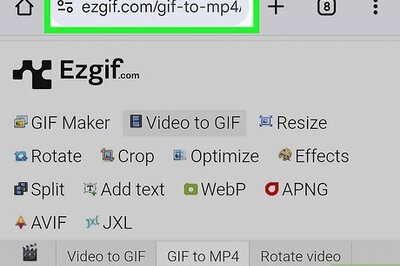
views
What is a “personality hire?”

A “personality hire” is someone who's mainly hired due to their behavior. This viral TikTok term describes a worker who lacks the hard skills or experience for a job, but is hired for their soft skills. Many “personality hires” believe their role is to maintain a positive environment in the workplace and improve relationships between clients, colleagues, and upper management. Some examples of soft skills include: strong communication, problem solving, teamwork and collaboration, conflict resolution, and networking.
Personality hires get a bad rep, but they inject energy into the workplace. On TikTok, there's a trending debate on whether it’s “fair” to hire people based on their personality. Some users believe personality hires don’t work hard or lack the necessary qualifications for the job, but they actually add immeasurable value to an organization. Their positive, fun-loving attitude attracts potential candidates, builds company culture, and keeps the office in good spirits. Many people who support personality hires believe technical skills can be taught, but interpersonal skills cannot (or are a lot harder to instill). Since personality hires are sociable, they tend to have a lot of connections too. This can be extremely helpful when it comes to securing deals or building good relationships with clients.
Pros of Personality Hires

Effective communication Socializing is second nature for personality hires, which means they can network easily, pitch any product or service, and resolve conflict in the workplace. They’re able to convey ideas clearly and efficiently, which is an essential skill for management and customer-facing roles.
Better client relations Since personality hires can connect with others quickly, they help bring more referrals and partnerships to an organization. Personality hires are confident and charming, which plays a huge part in securing business deals and promoting company growth in the long run.
Positive work environment Friendly and outgoing, a personality hire excels at building relationships within an organization. They’re usually the person who sends memes over email, plans in-office birthday celebrations, or remembers small details about everyone else. This helps employees feel valued, which can improve overall productivity, morale, and retention.
Enhanced creativity and innovation When people are comfortable expressing their opinions, they’re not afraid to suggest bold and unique ideas. Personality hires help people feel relaxed in the workplace, which can prompt new designs, tactics, and problem-solving strategies.
Strong leadership Personality hires often serve as the bridge between team members and upper management because they’re friendly with everyone at the company. If an employee feels scared to approach someone higher up, the personality hire comes to the rescue—they aren’t afraid to ask for an extension or deliver bad news!
Cons of Personality Hires

Lack of experience One of the biggest downsides of hiring someone based on their personality is having to spend more time and money on training. The onboarding process is already costly to most organizations, and the personality hire might not be able to learn all the necessary skills to succeed. This can decrease productivity within a team and pose performance issues in the long run.
Workplace conflict When someone is hired based on their personality, it can lead to resentment within the organization. Other team members may have to correct the work of the person who lacks the skills for the role, or take on extra responsibilities to pick up the slack. Furthermore, personality hires may form stronger bonds with upper management, which may look like favoritism to other employees.
Bias and diversity issues Judging candidates on their personality can be highly subjective, introducing biases in the hiring process. Managers may unconsciously choose candidates of a certain race, gender, or appearance, and this can exclude people who are more qualified and a better fit for the company.
Limited innovation By prioritizing personality, a manager may hire people who are too similar to each other. This limits the skills and experiences needed to address challenges in the workplace, and it can also prompt groupthink, where people are too afraid to suggest new ideas or play devil’s advocate.
Higher turnover rate If a candidate doesn’t have a strong desire to learn new skills or finds the work too challenging, they’re more likely to quit. This costs companies time and money because they have to refill the same position in a few months (or less).
Personality Hire vs Culture Fit
Culture fit goes beyond personality and focuses on company expectations. It refers to how compatible someone is with a company’s culture, goals, values, and work style. Personality does play a part in culture fit, but it’s only a small aspect of it. Employers are more interested in whether the candidate aligns with the company’s mission and is likely to thrive in the role. For example, a candidate who prefers working independently is not a good fit for a company that mainly consists of team-based projects. When it comes to personality hires, managers might follow their gut to see if a candidate is friendly or fun to work with. Candidates who align with the company’s culture possess both hard and soft skills for the role.
How to Become a Personality Hire at Your Next Job
Show off your personality but remain professional during a job interview. While it’s great to showcase your personality during the interview process, remember to stay focused. Hiring managers are looking for specific qualities that align with the role you’re applying for, so implement the following strategies to appear professional and personable: Pretend like your interview is a conversation between you and the hiring manager. Prepare a story that can help you break the ice within the first 2 minutes of your interview. Actively listen to the hiring manager, and smile when explaining a positive story or experience. Compliment the hiring manager’s questions, or bring up something you two share in common at the end of the interview.
What are the best jobs for a personality hire?

Hiring managers look for friendly candidates who work well in teams. Most personality hires have experience in the retail or service industry. They’re able to communicate effectively, defuse tension in the workplace, and maintain a positive attitude. While job fit depends on the specific company and culture, the following roles tend to be a good match for social people: Recruiter PR specialist Event planner HR representative Personal assistant Social media manager Customer service representative
Should you hire someone only based on personality?

No, seek candidates who possess both hard and soft skills. When hiring, look for individuals who have the relevant skills, experience, and expertise. Striking the right balance between personality and qualifications is the secret to success at your company. If you’re aiming to increase innovation and productivity, you may also want to consider hiring someone who offers a unique skill set or background.
















Comments
0 comment